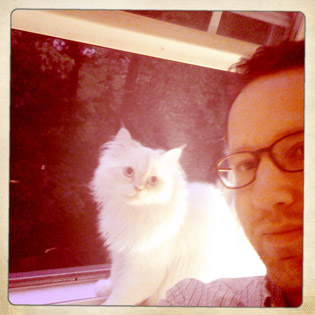Have you ever worked with someone who didn’t give 100%. Often, these people had passion and talent, but were waiting for the RIGHT opportunity before they really exerted themselves. So, job after job, they gave a half-hearted effort, and quit at the slightest sign of hard work because they felt it wasn’t worth their time.
 They had dreams, they had the ability, but they rarely flexed that muscle.
They had dreams, they had the ability, but they rarely flexed that muscle.
For instance, I worked with a waiter years ago who joked around, messed up orders, rarely smiled, and never went out of his way to help a customer. When I got to know him, I found out he was really a pretty talented guy, had some interesting goals, but felt frustrated that he hadn’t found the right opportunity yet.
So he languished as a waiter in the same restaurant for years.
What could he have done differently? Instead of waiting until he had a job that was worth his best effort, he should have just given it his all:
- Acted and presented himself like a professional.
- Put smiles on the faces of his customers in unexpected ways.
- Impressed his manager by offering to do things before asked.
- Gotten to know his customers, building relationships one order at a time.
- Supported his co-workers (both new and old), by sharing, giving & helping.
Why should he have put in all of this effort? Because our lives can be shaped in surprising ways by others. Many people get their jobs because of people they know, and they meet their significant others through similar means. John Lennon put it this way: “Life is what happens to you while you’re busy making other plans.”
I’ll bet you’ve seen similar things in your career, in a variety of different companies and roles. When we are stuck in a place we aren’t happy, why not give it our all? Why not develop a network around ourselves, develop our skills, and maximize the opportunity right in front of us, instead of waiting for something else to come along. Because this is the alternative:
How will anyone know how capable you are if you don’t develop your skills and prove that you are worthy of the opportunities they can give you?
It’s like the old saying: “The harder I worked, the luckier I got.”
So, what does this mean if you are a writer, an editor, a journalist, a creator of any kind? It means: PUBLISH NOW. However you can, wherever you can.
Blog. Tweet. Comment. Share. Help.
It means jumping into social media when you don’t feel ready. It means trying new formats when you don’t quite understand them yet. It means going out of your way to help others.
Doing so will grow your skills – forcing you to create and assist more often, and to confront the fear many of us have of putting ourselves in front of an audience or in an unfamiliar situation.
Publishing as often as you can also grows your network, and proves your value. Think you are writing incredible science fiction stories? Publish them on a blog. Think you are an expert in Dart Frog breeding habits, and hoping for a book deal? Publish now in any way you can.
And even beyond sharing: HELP. Publishing is no longer about the content, it is about the connection.
Thanks!
-Dan

 Two trends concern me though:
Two trends concern me though: What I’m asking is: if your goal is to be a writer, what does that have to do with a book? Now, I love books, and I understand how having a published book can benefit a writer in hundreds of obvious ways.
What I’m asking is: if your goal is to be a writer, what does that have to do with a book? Now, I love books, and I understand how having a published book can benefit a writer in hundreds of obvious ways. The weekend is another story. I can go a couple hours without checking Twitter, and come back to very few Tweets. Heck, it’s almost manageable!
The weekend is another story. I can go a couple hours without checking Twitter, and come back to very few Tweets. Heck, it’s almost manageable! I can remember weeks when I worked in a cube in an office building on Park Avenue in Manhattan, and I was swamped. So much going on, so busy. And let’s face it, that made me feel like a professional, it made me feel like an adult, and it made me feel proud.
I can remember weeks when I worked in a cube in an office building on Park Avenue in Manhattan, and I was swamped. So much going on, so busy. And let’s face it, that made me feel like a professional, it made me feel like an adult, and it made me feel proud.